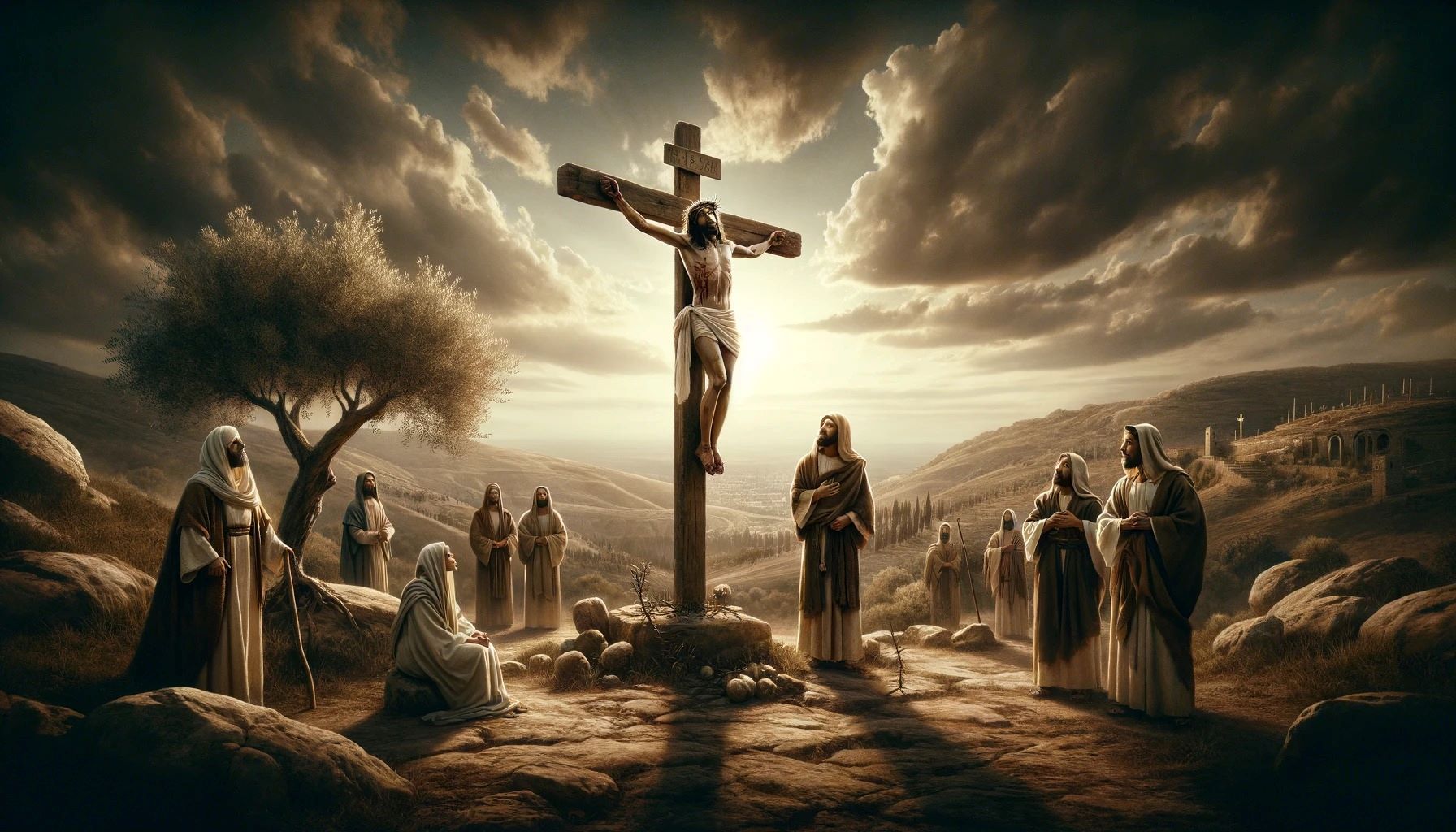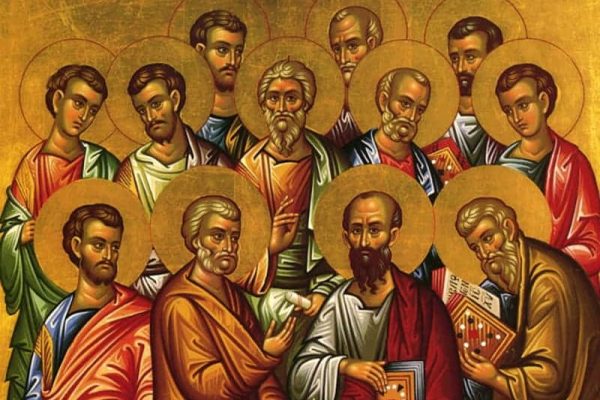Home>Bible Facts>When Did The Apostles Die


Bible Facts
When Did The Apostles Die
Published: February 17, 2024
Peter Smith, Editorial Director at Christian.net, combines deep insights into faith, politics, and culture to lead content creation that resonates widely. Awarded for his contributions to religious discourse, he previously headed a major organization for religious communicators, enhancing dialogue on faith's societal impacts.
Discover the fascinating Bible facts about the deaths of the apostles and their legacies. Uncover the historical timeline and significance of their passing. Explore more with us!
(Many of the links in this article redirect to a specific reviewed product. Your purchase of these products through affiliate links helps to generate commission for Christian.net, at no extra cost. Learn more)
Table of Contents
Introduction
The lives and deaths of the apostles are shrouded in historical significance and spiritual reverence. These twelve men, chosen by Jesus Christ to spread his teachings and establish the early Christian church, played pivotal roles in shaping the course of Christianity. Their unwavering faith, remarkable journeys, and ultimate sacrifices have left an indelible mark on the world.
The apostles' deaths are of particular interest, as they reflect the challenges and persecutions faced by early Christians. Understanding the circumstances surrounding their deaths provides valuable insights into the spread of Christianity and the fervor with which these men upheld their beliefs.
As we delve into the accounts of the apostles' deaths, we will uncover a tapestry of courage, resilience, and unwavering commitment to their faith. Each apostle's journey and eventual martyrdom serve as a testament to the enduring power of belief and the profound impact of their contributions to the Christian faith.
Join us on a compelling exploration of the lives and deaths of the apostles, as we unravel the remarkable stories of these extraordinary men who fearlessly carried the torch of Christianity into the world.
Read more: How Did The Apostles Die ?
The Death of Peter
Peter, also known as Simon Peter, was one of the foremost disciples of Jesus Christ and a prominent figure in the early Christian church. His unwavering devotion and steadfast commitment to spreading the teachings of Jesus made him a revered and influential figure among the apostles.
According to historical accounts and biblical references, Peter met his fate in Rome during the reign of Emperor Nero. Amidst the widespread persecution of Christians, Peter found himself targeted for his steadfast faith and unyielding proclamation of the gospel. Tradition holds that Peter was crucified, yet he requested to be crucified upside down, deeming himself unworthy to die in the same manner as his beloved teacher, Jesus Christ.
The circumstances surrounding Peter's death exemplify his profound humility and unwavering dedication to his faith. Despite facing imminent persecution and martyrdom, Peter remained resolute in his commitment to spreading the message of Christianity, even in the face of grave danger.
Peter's ultimate sacrifice stands as a testament to his unshakable faith and serves as an enduring example of courage and conviction for Christians around the world. His legacy continues to inspire countless individuals, serving as a reminder of the profound impact of unwavering faith and dedication to one's beliefs.
The death of Peter marked a pivotal moment in the early Christian church, solidifying his place as a foundational figure in the spread of Christianity. His unwavering commitment to his faith, even in the face of persecution and death, has left an indelible mark on the annals of Christian history, ensuring that his legacy endures through the ages.
The Death of Andrew
Andrew, the brother of Simon Peter, was among the earliest disciples of Jesus Christ. His fervent dedication to spreading the teachings of Jesus and his pivotal role in the establishment of the early Christian church have solidified his place as a revered figure in Christian history.
Historical accounts and religious traditions indicate that Andrew met his martyrdom in the city of Patras, located in present-day Greece. During the reign of the Roman governor Aegeas, Andrew fearlessly preached the gospel, drawing the ire of local authorities who viewed his teachings as a threat to the established order.
In the face of mounting opposition and persecution, Andrew remained steadfast in his mission, unwavering in his commitment to sharing the message of Christianity. His unwavering faith and unyielding dedication to his beliefs ultimately led to his arrest and subsequent crucifixion.
The manner of Andrew's crucifixion is particularly poignant, as he was affixed to an X-shaped cross, known as the saltire. Even in his final moments, Andrew's unwavering faith and resilience shone through, as he continued to proclaim the gospel and express his unwavering devotion to Jesus Christ.
Andrew's martyrdom serves as a powerful testament to the enduring strength of faith and the profound impact of unwavering commitment to one's beliefs. His willingness to endure persecution and ultimately sacrifice his life for the sake of spreading the gospel stands as a timeless example of courage and conviction.
The legacy of Andrew's unwavering faith and steadfast dedication continues to inspire Christians around the world, serving as a reminder of the profound impact of his contributions to the early Christian church. His martyrdom, marked by unwavering resolve and unyielding faith, remains a poignant symbol of the sacrifices made by the apostles in their unwavering commitment to spreading the message of Christianity.
Andrew's enduring legacy serves as a testament to the enduring power of faith and the profound impact of his contributions to the early Christian church. His martyrdom, marked by unwavering resolve and unyielding faith, remains a poignant symbol of the sacrifices made by the apostles in their unwavering commitment to spreading the message of Christianity.
The Death of James, son of Zebedee
James, the son of Zebedee, was a devoted disciple of Jesus Christ and a prominent figure among the twelve apostles. His unwavering commitment to the teachings of Jesus and his pivotal role in the early Christian church have solidified his place as a revered and influential figure in Christian history.
Historical accounts and biblical references provide insight into the circumstances surrounding James' martyrdom. During the early spread of Christianity, James journeyed to the region of Judea, where he fearlessly preached the gospel and shared the message of Jesus Christ. His fervent dedication to spreading the teachings of Christianity drew the attention of local authorities, who viewed his activities as a threat to the established order.
Amidst mounting opposition and persecution, James remained resolute in his mission, undeterred by the looming threat of danger. However, his unwavering commitment to his faith ultimately led to his arrest and subsequent martyrdom. Tradition holds that James was executed by the sword, a testament to his steadfast devotion to the gospel and his refusal to renounce his beliefs, even in the face of imminent death.
The circumstances surrounding James' death serve as a poignant reminder of the challenges faced by early Christians and the unwavering resolve exhibited by the apostles in the face of persecution. James' willingness to endure martyrdom rather than compromise his faith stands as a timeless example of courage and conviction, inspiring generations of Christians to uphold their beliefs with unwavering dedication.
James' enduring legacy continues to resonate within the annals of Christian history, serving as a testament to the enduring power of faith and the profound impact of his contributions to the early Christian church. His martyrdom, marked by unwavering resolve and unyielding faith, remains a poignant symbol of the sacrifices made by the apostles in their unwavering commitment to spreading the message of Christianity.
The death of James, son of Zebedee, stands as a testament to the enduring strength of faith and the profound impact of unwavering commitment to one's beliefs. His unwavering dedication to the gospel and his ultimate sacrifice serve as a timeless example of courage and conviction, inspiring countless individuals to uphold their faith with unwavering devotion.
The Death of John
John, often referred to as the beloved disciple, holds a revered place among the apostles of Jesus Christ. His profound influence, unwavering commitment to the teachings of Jesus, and pivotal role in the early Christian church have solidified his legacy as a figure of immense significance in Christian history.
According to historical accounts and biblical references, John's journey as a disciple of Jesus was marked by unwavering dedication and steadfast loyalty. His profound bond with Jesus and his role as a witness to the life and teachings of the Messiah positioned him as a central figure in the spread of Christianity.
As John fervently carried forth the message of Jesus Christ, his unwavering commitment to the gospel drew the attention of those who sought to suppress the burgeoning Christian movement. Amidst the backdrop of persecution and opposition, John remained resolute in his mission, undeterred by the looming threat of danger.
The circumstances surrounding John's death are steeped in historical significance and spiritual reverence. Tradition holds that during the reign of Emperor Domitian, John faced persecution for his unwavering proclamation of the gospel. Despite enduring exile to the island of Patmos, John continued to fervently share the message of Christianity, refusing to be silenced by the forces seeking to suppress his faith.
John's unwavering commitment to his beliefs ultimately led to his martyrdom. While the exact details of his death may vary in historical accounts, the enduring narrative depicts John's steadfast resolve and unyielding faith in the face of persecution. His willingness to endure suffering and sacrifice his life rather than renounce his beliefs stands as a timeless example of courage and conviction, inspiring generations of Christians to uphold their faith with unwavering dedication.
The enduring legacy of John's unwavering faith and steadfast dedication continues to resonate within the annals of Christian history, serving as a testament to the enduring power of faith and the profound impact of his contributions to the early Christian church. His martyrdom, marked by unwavering resolve and unyielding faith, remains a poignant symbol of the sacrifices made by the apostles in their unwavering commitment to spreading the message of Christianity.
John's ultimate sacrifice stands as a testament to the enduring strength of faith and the profound impact of unwavering commitment to one's beliefs. His unwavering dedication to the gospel and his ultimate sacrifice serve as a timeless example of courage and conviction, inspiring countless individuals to uphold their faith with unwavering devotion.
Read more: Why And How Did Paul The Apostle Die?
The Death of Philip
Philip, one of the twelve apostles chosen by Jesus Christ, played a pivotal role in the early spread of Christianity. His unwavering commitment to the teachings of Jesus and his fervent dedication to sharing the message of the gospel solidified his place as a revered figure in Christian history.
Historical accounts and biblical references provide insight into the circumstances surrounding Philip's martyrdom. As Philip fearlessly journeyed to various regions, his steadfast proclamation of the gospel drew the attention of those who sought to suppress the burgeoning Christian movement. Despite facing opposition and persecution, Philip remained resolute in his mission, undeterred by the looming threat of danger.
Tradition holds that Philip's unwavering commitment to his faith ultimately led to his martyrdom. While the exact details of his death may vary in historical accounts, the enduring narrative depicts Philip's steadfast resolve and unyielding faith in the face of persecution. His willingness to endure suffering and sacrifice his life rather than renounce his beliefs stands as a timeless example of courage and conviction, inspiring generations of Christians to uphold their faith with unwavering dedication.
Philip's enduring legacy continues to resonate within the annals of Christian history, serving as a testament to the enduring power of faith and the profound impact of his contributions to the early Christian church. His martyrdom, marked by unwavering resolve and unyielding faith, remains a poignant symbol of the sacrifices made by the apostles in their unwavering commitment to spreading the message of Christianity.
The death of Philip stands as a testament to the enduring strength of faith and the profound impact of unwavering commitment to one's beliefs. His unwavering dedication to the gospel and his ultimate sacrifice serve as a timeless example of courage and conviction, inspiring countless individuals to uphold their faith with unwavering devotion.
The Death of Bartholomew
Bartholomew, also known as Nathanael, was a devoted apostle of Jesus Christ, revered for his unwavering commitment to spreading the teachings of the gospel. His journey as a disciple was marked by steadfast dedication and a fervent proclamation of the message of Christianity. As Bartholomew fearlessly traversed various regions, his unwavering faith drew the attention of those who sought to suppress the burgeoning Christian movement.
Historical accounts and religious traditions provide insight into the circumstances surrounding Bartholomew's martyrdom. Amidst the backdrop of persecution and opposition, Bartholomew remained resolute in his mission, undeterred by the looming threat of danger. Tradition holds that Bartholomew's unwavering commitment to his faith ultimately led to his martyrdom. While the exact details of his death may vary in historical accounts, the enduring narrative depicts Bartholomew's steadfast resolve and unyielding faith in the face of persecution.
Bartholomew's willingness to endure suffering and sacrifice his life rather than renounce his beliefs stands as a timeless example of courage and conviction, inspiring generations of Christians to uphold their faith with unwavering dedication. His enduring legacy continues to resonate within the annals of Christian history, serving as a testament to the enduring power of faith and the profound impact of his contributions to the early Christian church. His martyrdom, marked by unwavering resolve and unyielding faith, remains a poignant symbol of the sacrifices made by the apostles in their unwavering commitment to spreading the message of Christianity.
The death of Bartholomew stands as a testament to the enduring strength of faith and the profound impact of unwavering commitment to one's beliefs. His unwavering dedication to the gospel and his ultimate sacrifice serve as a timeless example of courage and conviction, inspiring countless individuals to uphold their faith with unwavering devotion.
The Death of Thomas
Thomas, also known as Didymus, was a devoted apostle of Jesus Christ, recognized for his unwavering dedication to spreading the teachings of the gospel. His journey as a disciple was marked by steadfast commitment and a fervent proclamation of the message of Christianity. As Thomas fearlessly traversed various regions, his unwavering faith drew the attention of those who sought to suppress the burgeoning Christian movement.
Historical accounts and religious traditions provide insight into the circumstances surrounding Thomas's martyrdom. Amidst the backdrop of persecution and opposition, Thomas remained resolute in his mission, undeterred by the looming threat of danger. Tradition holds that Thomas's unwavering commitment to his faith ultimately led to his martyrdom. While the exact details of his death may vary in historical accounts, the enduring narrative depicts Thomas's steadfast resolve and unyielding faith in the face of persecution.
Thomas's willingness to endure suffering and sacrifice his life rather than renounce his beliefs stands as a timeless example of courage and conviction, inspiring generations of Christians to uphold their faith with unwavering dedication. His enduring legacy continues to resonate within the annals of Christian history, serving as a testament to the enduring power of faith and the profound impact of his contributions to the early Christian church. His martyrdom, marked by unwavering resolve and unyielding faith, remains a poignant symbol of the sacrifices made by the apostles in their unwavering commitment to spreading the message of Christianity.
The death of Thomas stands as a testament to the enduring strength of faith and the profound impact of unwavering commitment to one's beliefs. His unwavering dedication to the gospel and his ultimate sacrifice serve as a timeless example of courage and conviction, inspiring countless individuals to uphold their faith with unwavering devotion.
The Death of Matthew
Matthew, also known as Levi, was a devoted apostle of Jesus Christ, recognized for his unwavering dedication to spreading the teachings of the gospel. His journey as a disciple was marked by steadfast commitment and a fervent proclamation of the message of Christianity. As Matthew fearlessly traversed various regions, his unwavering faith drew the attention of those who sought to suppress the burgeoning Christian movement.
Historical accounts and religious traditions provide insight into the circumstances surrounding Matthew's martyrdom. Amidst the backdrop of persecution and opposition, Matthew remained resolute in his mission, undeterred by the looming threat of danger. Tradition holds that Matthew's unwavering commitment to his faith ultimately led to his martyrdom. While the exact details of his death may vary in historical accounts, the enduring narrative depicts Matthew's steadfast resolve and unyielding faith in the face of persecution.
Matthew's willingness to endure suffering and sacrifice his life rather than renounce his beliefs stands as a timeless example of courage and conviction, inspiring generations of Christians to uphold their faith with unwavering dedication. His enduring legacy continues to resonate within the annals of Christian history, serving as a testament to the enduring power of faith and the profound impact of his contributions to the early Christian church. His martyrdom, marked by unwavering resolve and unyielding faith, remains a poignant symbol of the sacrifices made by the apostles in their unwavering commitment to spreading the message of Christianity.
The death of Matthew stands as a testament to the enduring strength of faith and the profound impact of unwavering commitment to one's beliefs. His unwavering dedication to the gospel and his ultimate sacrifice serve as a timeless example of courage and conviction, inspiring countless individuals to uphold their faith with unwavering devotion.
Read more: When Did St John The Baptist Die
The Death of James, son of Alphaeus
James, son of Alphaeus, was a devoted apostle of Jesus Christ, recognized for his unwavering dedication to spreading the teachings of the gospel. His journey as a disciple was marked by steadfast commitment and a fervent proclamation of the message of Christianity. As James fearlessly traversed various regions, his unwavering faith drew the attention of those who sought to suppress the burgeoning Christian movement.
Historical accounts and religious traditions provide insight into the circumstances surrounding James's martyrdom. Amidst the backdrop of persecution and opposition, James remained resolute in his mission, undeterred by the looming threat of danger. Tradition holds that James's unwavering commitment to his faith ultimately led to his martyrdom. While the exact details of his death may vary in historical accounts, the enduring narrative depicts James's steadfast resolve and unyielding faith in the face of persecution.
James's willingness to endure suffering and sacrifice his life rather than renounce his beliefs stands as a timeless example of courage and conviction, inspiring generations of Christians to uphold their faith with unwavering dedication. His enduring legacy continues to resonate within the annals of Christian history, serving as a testament to the enduring power of faith and the profound impact of his contributions to the early Christian church. His martyrdom, marked by unwavering resolve and unyielding faith, remains a poignant symbol of the sacrifices made by the apostles in their unwavering commitment to spreading the message of Christianity.
The death of James, son of Alphaeus, stands as a testament to the enduring strength of faith and the profound impact of unwavering commitment to one's beliefs. His unwavering dedication to the gospel and his ultimate sacrifice serve as a timeless example of courage and conviction, inspiring countless individuals to uphold their faith with unwavering devotion.
The Death of Thaddaeus
Thaddaeus, also known as Judas Thaddaeus or Jude, was a revered apostle of Jesus Christ, recognized for his unwavering commitment to spreading the teachings of the gospel. His journey as a disciple was marked by steadfast dedication and a fervent proclamation of the message of Christianity. Thaddaeus fearlessly traversed various regions, sharing the transformative message of Jesus Christ and drawing the attention of those who sought to suppress the burgeoning Christian movement.
Historical accounts and religious traditions provide insight into the circumstances surrounding Thaddaeus's martyrdom. Amidst the backdrop of persecution and opposition, Thaddaeus remained resolute in his mission, undeterred by the looming threat of danger. Tradition holds that Thaddaeus's unwavering commitment to his faith ultimately led to his martyrdom. While the exact details of his death may vary in historical accounts, the enduring narrative depicts Thaddaeus's steadfast resolve and unyielding faith in the face of persecution.
Thaddaeus's willingness to endure suffering and sacrifice his life rather than renounce his beliefs stands as a timeless example of courage and conviction, inspiring generations of Christians to uphold their faith with unwavering dedication. His enduring legacy continues to resonate within the annals of Christian history, serving as a testament to the enduring power of faith and the profound impact of his contributions to the early Christian church. His martyrdom, marked by unwavering resolve and unyielding faith, remains a poignant symbol of the sacrifices made by the apostles in their unwavering commitment to spreading the message of Christianity.
The death of Thaddaeus stands as a testament to the enduring strength of faith and the profound impact of unwavering commitment to one's beliefs. His unwavering dedication to the gospel and his ultimate sacrifice serve as a timeless example of courage and conviction, inspiring countless individuals to uphold their faith with unwavering devotion. Thaddaeus's unwavering commitment to the teachings of Jesus Christ and his ultimate sacrifice exemplify the profound impact of the apostles' unwavering dedication to spreading the transformative message of Christianity.
The Death of Simon the Zealot
Simon the Zealot, also known as Simon the Cananaean, was a devoted apostle of Jesus Christ, recognized for his unwavering commitment to spreading the teachings of the gospel. His journey as a disciple was marked by steadfast dedication and a fervent proclamation of the message of Christianity. Simon fearlessly traversed various regions, sharing the transformative message of Jesus Christ and drawing the attention of those who sought to suppress the burgeoning Christian movement.
Historical accounts and religious traditions provide insight into the circumstances surrounding Simon the Zealot's martyrdom. Amidst the backdrop of persecution and opposition, Simon remained resolute in his mission, undeterred by the looming threat of danger. Tradition holds that Simon's unwavering commitment to his faith ultimately led to his martyrdom. While the exact details of his death may vary in historical accounts, the enduring narrative depicts Simon's steadfast resolve and unyielding faith in the face of persecution.
Simon the Zealot's willingness to endure suffering and sacrifice his life rather than renounce his beliefs stands as a timeless example of courage and conviction, inspiring generations of Christians to uphold their faith with unwavering dedication. His enduring legacy continues to resonate within the annals of Christian history, serving as a testament to the enduring power of faith and the profound impact of his contributions to the early Christian church. His martyrdom, marked by unwavering resolve and unyielding faith, remains a poignant symbol of the sacrifices made by the apostles in their unwavering commitment to spreading the message of Christianity.
The death of Simon the Zealot stands as a testament to the enduring strength of faith and the profound impact of unwavering commitment to one's beliefs. His unwavering dedication to the gospel and his ultimate sacrifice serve as a timeless example of courage and conviction, inspiring countless individuals to uphold their faith with unwavering devotion. Simon the Zealot's unwavering commitment to the teachings of Jesus Christ and his ultimate sacrifice exemplify the profound impact of the apostles' unwavering dedication to spreading the transformative message of Christianity.
The Death of Matthias
Matthias, the apostle chosen to replace Judas Iscariot, played a significant role in the early Christian church. His unwavering commitment to spreading the teachings of Jesus Christ and his pivotal role in the establishment of the apostolic ministry solidified his place as a revered figure in Christian history.
Historical accounts and religious traditions provide insight into the circumstances surrounding Matthias's martyrdom. As Matthias fearlessly journeyed to various regions, his steadfast proclamation of the gospel drew the attention of those who sought to suppress the burgeoning Christian movement. Despite facing opposition and persecution, Matthias remained resolute in his mission, undeterred by the looming threat of danger.
Tradition holds that Matthias's unwavering commitment to his faith ultimately led to his martyrdom. While the exact details of his death may vary in historical accounts, the enduring narrative depicts Matthias's steadfast resolve and unyielding faith in the face of persecution. His willingness to endure suffering and sacrifice his life rather than renounce his beliefs stands as a timeless example of courage and conviction, inspiring generations of Christians to uphold their faith with unwavering dedication.
Matthias's enduring legacy continues to resonate within the annals of Christian history, serving as a testament to the enduring power of faith and the profound impact of his contributions to the early Christian church. His martyrdom, marked by unwavering resolve and unyielding faith, remains a poignant symbol of the sacrifices made by the apostles in their unwavering commitment to spreading the message of Christianity.
The death of Matthias stands as a testament to the enduring strength of faith and the profound impact of unwavering commitment to one's beliefs. His unwavering dedication to the gospel and his ultimate sacrifice serve as a timeless example of courage and conviction, inspiring countless individuals to uphold their faith with unwavering devotion. Matthias's unwavering commitment to the teachings of Jesus Christ and his ultimate sacrifice exemplify the profound impact of the apostles' unwavering dedication to spreading the transformative message of Christianity.













